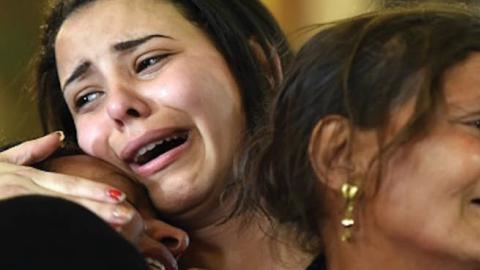With Holy Week starting in nine days, Copts across Egypt were preparing for the most important week in their faith. Unlike in the West, Easter—and, more precisely, the week that precedes it—and not Christmas is the center of the Coptic calendar. Church interiors are covered in black cloth, hymns are sung in a funereal tone, and services are conducted day and night. No other event takes place, not even funerals for those unlucky enough to die during that week.
But in the village of Nag Khalaf Allah, in Egypt’s south, Copts’ preparations for Holy week were interrupted by a mob. At 4 pm on April 12, 2019, as children were in their Sunday school classes, the attack began on the Saint Karas church. The church, like thousands across the country, did not have official registration papers since obtaining them from the regime is a nearly impossible task. But Copts had been praying in it for years, and Saint Karas church had submitted its request for registration in 2017, as required by a 2016 law. The mob was driven into a frenzy by rumors that Copts were planning to expand church building. The attack was thankfully not deadly: two Copts were injured, one of whom is the village priest, and damage was limited. The incident, however, was hardly unique. Hundreds of similar attacks had already taken place, and usually for the same reason—rumors of church construction. Like all of these attacks, not a single person was punished in Nag Khalaf Allah. Instead, as is the regime’s common practice, a reconciliation session was held to pressure the Copts. In the case of Nag Khalaf Allah, the security services decided to permanently close the church. Copts in the village would have to do without Holy Week.
In the pages of the New York Post, its op-ed editor Sohrab Ahmari laments that “you will never hear the voices of this Christian community, one of the world’s oldest,” in Western media coverage of Egypt. He is correct. Far too often, Western analysis of Egypt, as well as the broader Middle East and North Africa, focusses on the region’s majority population, the Arab Sunni Muslims, and neglects the rich mosaic of religious and ethnic communities that preceded Islam. This weakness is found across the board in Western policy circles, the media, and academic studies of the Middle East, resulting in faulty understandings of the region and, more tragically, catastrophic outcomes. Disappointingly, however, Ahmari’s article does not shed any light on the plight of this ancient Christian community, or tell stories of mob violence and the government’s complicity in such attacks, or expose the legal discrimination in Egypt, or explain what has made over a million Copts leave the country in recent decades. Instead, Ahmari has chosen to defend the regime that discriminates against them.
Ahmari’s real target is five and a half thousand miles from Egypt. While his article quotes Coptic voices, their comments merely serve as ammunition with which to attack the New York Times‘s coverage and opinion pieces on Egypt. His actual concern is not the persecution of Copts but rather the tendency of US punditry to forward idealistic policy prescriptions that fail to account for the likely consequences. This criticism is certainly warranted, but that should never be an excuse to whitewash the persecution of the Copts.
Unfortunately, Ahmari is hardly alone in his analysis. For the past six years, since the Muslim Brotherhood’s government was overthrown by General Sisi, Western delegations, often composed of evangelical leaders, have returned from the country telling a similar story to Ahmari’s; not only is the choice in Egypt a binary one between the Islamists and Sisi, but more profoundly, President Sisi is held to be a champion of religious freedom. Their arguments are often based on similar claims: that Sisi called for a religious revolution in Islam, and that a grand cathedral is built in the new capital (a move that earned Sisi a laudatory tweet from President Trump). To this list, Ahmari adds that Sisi has asked for churches to be built in new cities, and that “a new law has lifted a centuries-old barrier on church-building.” But is any of that actually true?
Let us, for the sake of the argument, ignore Sisi’s dismal human rights record for now and focus instead on the repeated claim that he’s a champion of religious freedom. According to Ahmari, the church building law passed by the Egyptian parliament in 2016 has meant that “Protestants alone have received 227 permits.” In fact, the new law makes it nearly impossible for new churches to be built in existing cities by tying their approval and space to an unspecified necessary minimum number of Christians in an unspecified area. In practice, this has meant that, in the three years since, not a single church has been approved in existing cities. Since taking power, President Sisi has approved the building of 35 new churches in new cities built in the desert, but none in any inhabited by actual Copts. This record is worse than that of former President Hosni Mubarak, who Ahmari compares unfavorably to Sisi.
The 227 permits Ahmari mentions are registration applications made by existing churches where prayers have been held for decades. But even here, the new law, supposedly a blessing, has turned into a nightmare. It stipulates that applications from churches like Saint Karas must be submitted for approval by a government committee headed by the Prime Minister and including representatives of the military, intelligence, and state security; entities hardly known for supporting religious freedom. Egypt’s various Christian denominations have submitted requests for a total of 3,730 churches and around 2,000 church service buildings. Three years on, the government has approved less than 20 percent of that number. Moreover, as in the case of Saint Karas church, security services often resort to closing existing churches to prevent them from obtaining approval. In the past three years, the government has shut down 22 Coptic churches, which hardly constitutes a record of religious freedom.
One example sums up the government’s policy; the new grand cathedral. According to regime propaganda repeated by Western supporters, the cathedral is the largest in the Middle East (it isn’t) and was built by the government (it wasn’t—Coptic businessmen paid for the building). More insulting still is the fact that Sisi named it. Contrary to the Coptic practice of naming our churches after Saints, Sisi decided to name it “the Cathedral of the Birth of Christ.” A president naming a church may be insulting enough, but the name is no coincidence. Muslims acknowledge the miraculous birth of Christ but not his crucifixion or resurrection. This is why Sisi has always visited the Coptic church on Christmas but never on Easter.
What of government appointments? Ahmari states that “under former President Hosni Mubarak, the ruling party typically had one or two Coptic Christians in Parliament; today, there are 38.” This is not true either. Under Mubarak there were typically between five and eight Christians in parliament, and the reason there are now 38 is that the new constitution, passed before Sisi became President, stipulates a time-limited quota system for Copts and six other categories. While Sisi has taken the courageous step of appointing two Coptic governors in the country, his government only includes one Copt with an unimportant portfolio among its 30-plus ministers. Even Mubarak always had two Copts in his governments, and one of them was the Finance Minister. More importantly, why has Sisi not opened the doors for Copts to join the Egyptian intelligence and state security, two government bodies that are Copt-free? And why are there no Coptic senior officers in the military?
But the plight of Copts in Egypt is not limited to church building or the lack of equality. In the past several decades, over 1,000 mob attacks have taken place on Copts in Egypt’s villages and towns. Under Sisi, the number of those attacks has increased. In none of these incidents, whether under President Sadat, Mubarak, the military rule, Morsi, or Sisi has a single person ever faced trial. The government is always happy to try Islamists, its sworn enemies, but it has shown no interest in punishing regular Egyptians for pogroms that have terrified Copts and which have included dozens of murders. Instead, the Sisi government continues the practice of holding reconciliation sessions. These have created a culture of impunity and encouragement which rewards the attackers by meeting their demands. The message is clear: you can attack Copts, get away with it, and be rewarded.
In Ahmari’s telling, this is all the fault of local officials and not President Sisi. Quoting the head of Egypt’s Protestant community he writes, “local officials haven’t always kept up with the central government’s new mentality,” and these attacks are the workings of the Muslim Brotherhood and other radicals who “have a plan to attack Christians from time to time and especially when the President is meeting foreign officials—to embarrass the central government.” The President must be meeting a lot of foreign officials, because these attacks take place on a regular basis. But, more importantly, blaming local officials ignores the fact that Egypt is a dictatorship, in which any dissent is punished. Why has Sisi not fired those officials who publicly ignore his supposed policies? And why, after five years as president, has he failed to address the problem? Mob attacks are not driven by the Muslim Brotherhood, they are conducted by regular Egyptians, the Copts’ neighbors. If Sisi really cared, why hasn’t he addressed the hate speech coming from Al Azhar which is rampant in Egypt’s educational system? And why has he not attempted to amend or repeal the blasphemy law that has almost exclusively been applied to Copts and other religious minorities?
The answer can actually be found in Ahmari’s article. If Sisi is already receiving praise from Western journalists for his great record on religious freedom record, why should he do anything to actually protect Copts? Instead of helping Copts, articles like Ahmari’s only help to enshrine their persecution in Egypt, by removing any pressure on the Egyptian regime to address the plight of Copts.
Sohrab Ahmari asks us to listen to Egyptian Christian voices, and we should. But, like any community, the voices of Copts are hardly monolithic. They include those of the families of the martyrs of Mapsero, killed by Egyptian soldiers, who still wait for justice. They include Coptic youth who chanted for the fall of Sisi after the Saint Peter church bombing. They include those of Mueller Edward, Bassem Hanna, Alber Ashraf, and Clinton Youssef, four Coptic kids who faced five-year sentences for a video deemed offensive to Islam, and who escaped Egypt to Switzerland, while their teacher languishes in prison. They also include over one million Copts who fled to the West to escape persecution. These voices are certainly freer than those of the Copts inside who understand the consequences of criticism, or of those who betray their own besieged community by collaborating with the regime.
Ahmari and others are welcome to argue that there is a binary choice in Egypt and that Sisi is better than the alternative. They can contend that the United States has no option but to support Sisi and that change in Egypt would have catastrophic results. But those arguments should be made on their merits and not by whitewashing the plight of Copts. The least we should expect from Western Christians is that they refuse to become accomplices in our persecution.
Read in Quillette

















